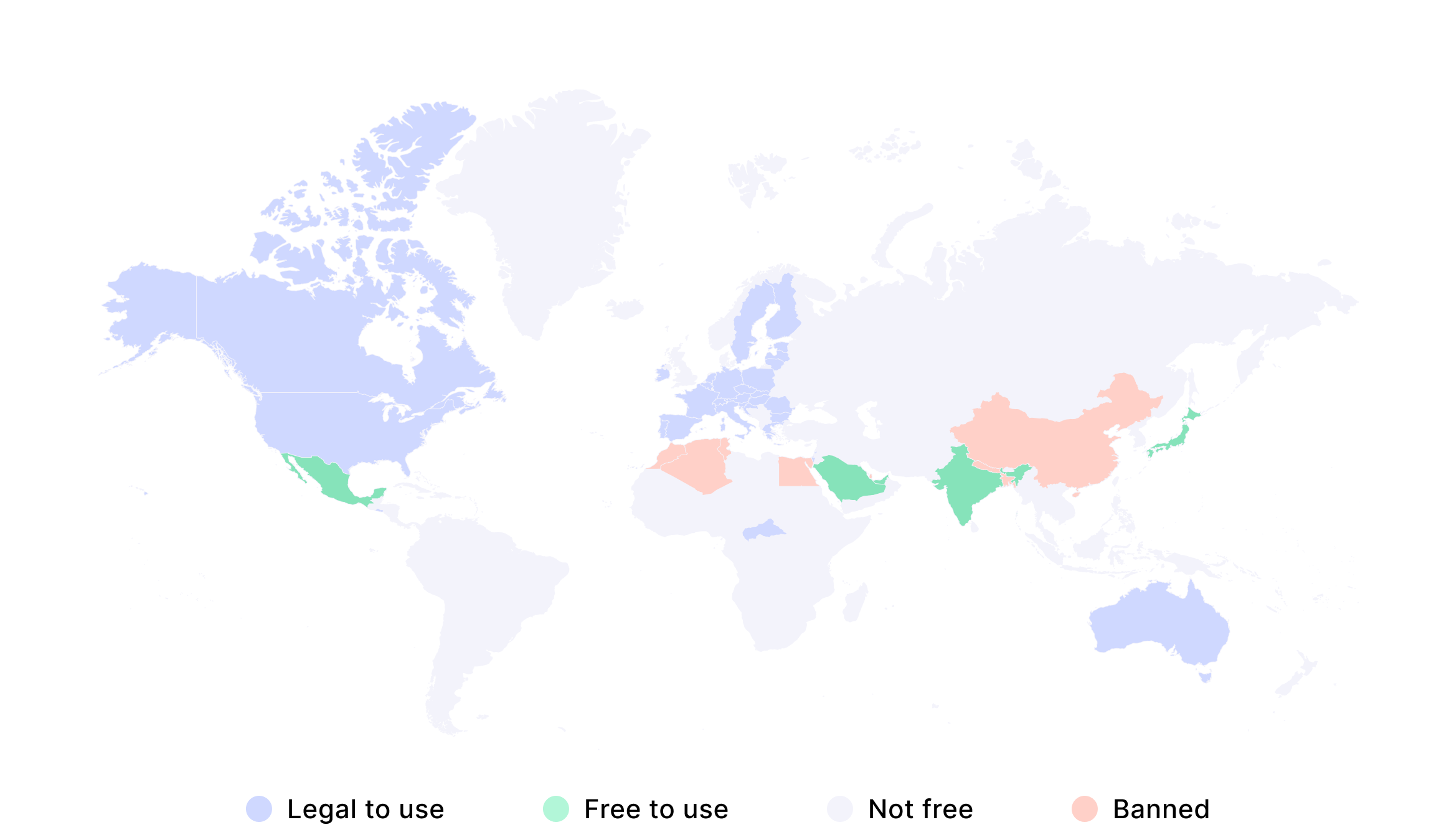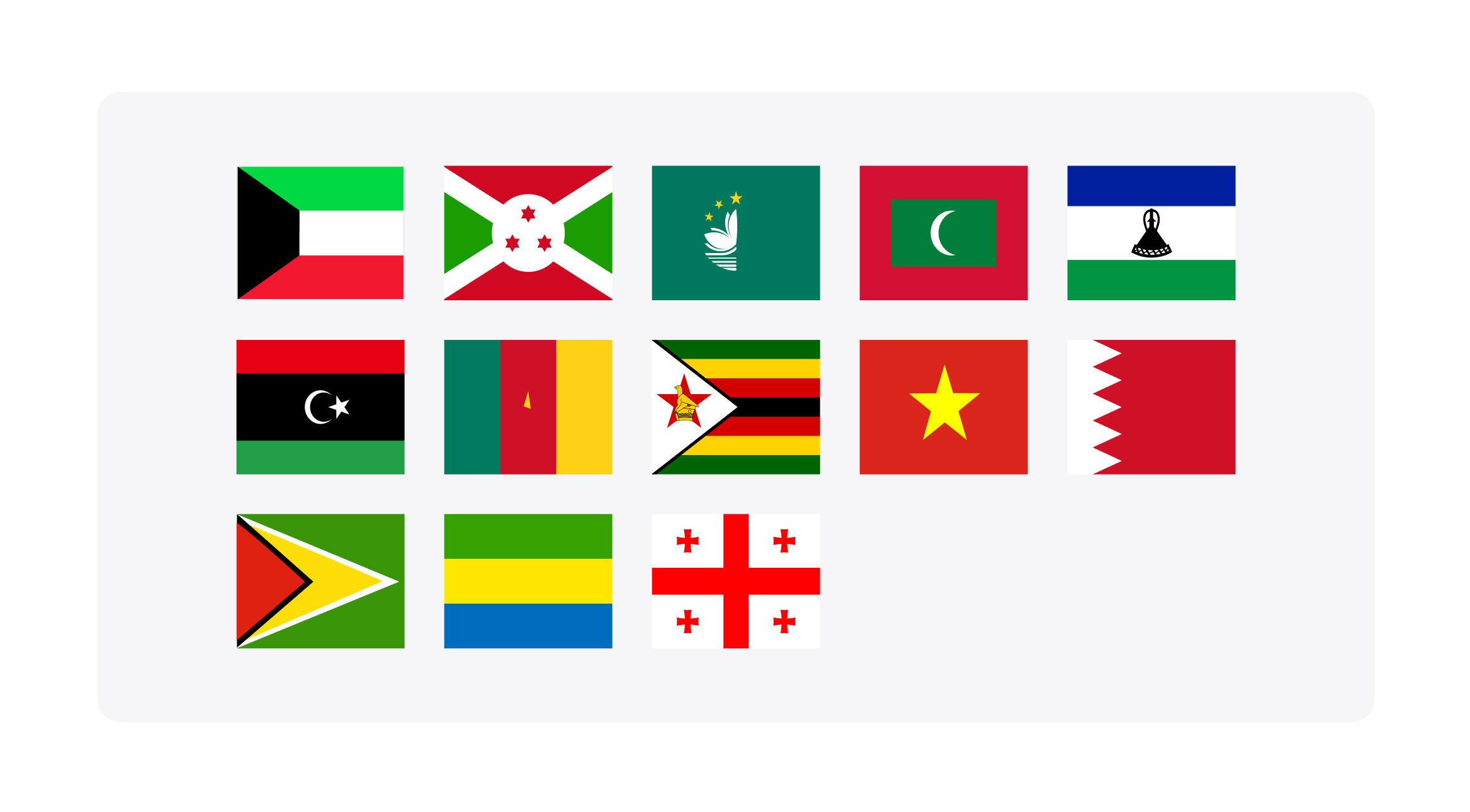Tình trạng pháp lý của Bitcoin phụ thuộc vào quốc gia. Ở một số tiểu bang, nó được công nhận là một loại tiền tệ chính thức. Ở những nơi khác, nó có thể được sử dụng tự do, nhưng không được coi là đấu thầu hợp pháp. Một số chính phủ cho phép giao dịch tiền điện tử nhưng cấm thanh toán. Những người khác đã áp đặt lệnh cấm một phần hoặc toàn bộ.
Hướng dẫn này nêu bật nơi Bitcoin được chấp nhận để thanh toán. Một số quốc gia có khuôn khổ pháp lý rõ ràng; một số khác hoạt động trong vùng xám. Tài liệu này là để tham khảo chung - luật pháp địa phương nên được xem xét trước khi sử dụng tiền điện tử ở bất kỳ khu vực pháp lý nào.

Các quốc gia nơi mọi người có thể sử dụng Bitcoin hợp pháp
Ở các quốc gia nơi tiền điện tử là hợp pháp, các công ty có thể chấp nhận Bitcoin như một hình thức thanh toán cho hàng hóa và dịch vụ. Một số sử dụng nó cho các giao dịch xuyên biên giới, những người khác tích hợp nó vào hệ thống thanh toán thông qua các nhà cung cấp được cấp phép.
Hầu hết các giao dịch phải tuân theo các quy tắc tuân thủ tiêu chuẩn: kiểm tra danh tính, giám sát giao dịch, báo cáo thuế. Bitcoin thường được coi là một tài sản kỹ thuật số, không phải tiền tệ, nhưng việc sử dụng hợp pháp vẫn mở ra các lựa chọn cho các doanh nghiệp làm việc trên thị trường quốc tế.
Dưới đây là danh sách các khu vực pháp lý nơi thanh toán tiền điện tử được phép hợp pháp và được sử dụng trong các cài đặt thương mại.

El Salvador
El Salvador là một trong hai quốc gia đầu tiên trên thế giới chấp nhận Bitcoin như một đấu thầu hợp pháp. Quốc hội El Salvador đã thông qua một dự luật của Tổng thống Bukele vào năm 2021. Dự luật chính thức thông báo rằng tiền điện tử sẽ trở thành một hình thức trao đổi giá trị hợp pháp và giúp công dân hàng ngày có thể mua hàng hóa và dịch vụ bằng tiền điện tử theo khuôn khổ pháp lý quốc gia cho các loại tiền kỹ thuật số.
Cộng hòa Trung Phi
Chỉ có hai quốc gia trên thế giới công nhận Bitcoin là tiền thầu hợp pháp thực sự. Đầu tiên là El Salvador. Thứ hai là Cộng hòa Trung Phi. Nó đã chấp nhận Bitcoin làm tiền thầu hợp pháp vào quý II năm 2022, sau một sự thay đổi trong chính sách của chính phủ nhằm mục đích công nhận tiền điện tử rộng hơn trong nền kinh tế quốc gia.
Hoa Kỳ
Tại Hoa Kỳ, các cá nhân và doanh nghiệp lưu trữ hoặc trao đổi Bitcoin thuộc danh mục MSB - kinh doanh dịch vụ tiền tệ. Tất cả MSB đều phải tuân theo Đạo luật Bí mật Ngân hàng và luật AML liên quan.
Kho bạc đã định nghĩa Bitcoin là một loại tiền tệ có thể trao đổi có thể hoạt động như một sự thay thế cho tiền thật. Luật tiền điện tử bổ sung được áp dụng khi điều tra hoạt động bất hợp pháp hoặc hành vi sai trái tài chính liên quan đến tài sản kỹ thuật số, nhưng các cá nhân và doanh nghiệp được tự do sử dụng tiền điện tử để thanh toán.
Để tìm hiểu thêm về quyền lưu ký tiền điện tử và Làm thế nào các doanh nghiệp có thể nắm giữ tài sản kỹ thuật số Về mặt pháp lý, hãy khám phá bài viết này trên B2BinPay.
Vương quốc Anh
Ở Anh, Bitcoin không phải là đấu thầu hợp pháp. Tuy nhiên, sử dụng nó để thanh toán được cho phép. Các công ty có thể chấp nhận tiền điện tử nếu họ tuân theo các quy tắc đăng ký và đáp ứng các tiêu chuẩn báo cáo tài chính.
Bitcoin được coi là một tài sản kỹ thuật số và bị đánh thuế theo luật hiện hành. Vương quốc Anh không nằm trong danh sách các quốc gia đấu thầu hợp pháp bitcoin, nhưng nó vẫn là một trong những quốc gia hợp pháp tiền điện tử có vị trí pháp lý xác định.
Chính phủ đặt ra các quy tắc thông qua một khung pháp lý chính thức, tập trung vào việc tuân thủ và minh bạch trong hoạt động liên quan đến tiền điện tử.
Liên minh châu Âu
EU tin rằng token là một loại tài sản và không coi việc sử dụng chúng là bất hợp pháp.
Liên minh châu Âu có lập trường phức tạp về tiền điện tử, nhưng nhiều quốc gia EU đã thực hiện các bước để cải thiện quy định về mã thông báo. Một số quốc gia, chẳng hạn như Bỉ, Phần Lan và Bulgaria, đã ban hành luật về việc sử dụng tiền điện tử.
Cơ quan Ngân hàng Châu Âu đã cảnh báo về những rủi ro liên quan đến tài sản tiền điện tử và không kiểm soát các hoạt động tài sản tiền điện tử. Vào năm 2022, EU đã đề xuất luật pháp về thực thi tiền điện tử và các quy tắc đầu tư cho tài sản kỹ thuật số.
Canada
Ở Canada, tiền điện tử được coi là một mặt hàng cho mục đích thuế. Các sàn giao dịch tiền điện tử được phân loại là các doanh nghiệp dịch vụ tiền tệ.
Chính phủ Canada có luật pháp và quy định nghiêm ngặt để ngăn chặn rửa tiền và tài trợ khủng bố thông qua việc sử dụng tiền điện tử. Miễn là người dùng đáp ứng các yêu cầu tuân thủ tiền điện tử, họ có thể tự do sử dụng và giao dịch tiền điện tử ở Canada.
Ixraen
Israel mở cửa cho việc sử dụng tiền điện tử, với nhiều máy ATM tiền điện tử và thương nhân trên khắp đất nước chấp nhận Bitcoin làm thanh toán. Đây là một trong những quốc gia được chấp nhận bitcoin, với sự chấp nhận ngày càng tăng trong bán lẻ.
Cơ quan thuế ở Israel hiện không coi Bitcoin là tiền tệ, chứng khoán hoặc tài sản. Tuy nhiên, thuế tiền điện tử 25% được áp dụng khi người bán bán Bitcoin.
Nước Úc
Quan điểm của Australia cũng tương tự như của Canada. Chính quyền Úc coi tiền điện tử là tài sản kỹ thuật số có giá trị có thể bị đánh thuế. Phân loại này xác định cách xử lý thuế đối với các giao dịch tiền điện tử.
Nếu ai đó mua, bán, tặng hoặc chuyển đổi tiền điện tử thành fiat để mua, nó sẽ kích hoạt sự kiện tăng vốn. Tuy nhiên, nếu tiền điện tử được giữ mà không có giao dịch tích cực, thuế thường không được áp dụng.
Ở Úc, bạn cũng được yêu cầu lưu giữ hồ sơ về các giao dịch của mình, mặc dù ví và sàn giao dịch thường xử lý việc này. Tính hợp pháp giao dịch được xác định rõ ràng, nhưng người dùng được kỳ vọng sẽ tuân thủ các quy tắc báo cáo.
Các quốc gia nơi Bitcoin có thể được sử dụng tự do
Các quốc gia khác cũng cho phép tiền điện tử được sử dụng trong các giao dịch và đang nghiên cứu một số hình thức luật tiền điện tử tích hợp tài sản kỹ thuật số vào luật tài chính hiện hành. Một số ví dụ là:

Ấn Độ
Lập trường của Ấn Độ về tiền điện tử rất phức tạp và đã thay đổi theo thời gian. Bộ trưởng Tài chính cam kết loại bỏ việc sử dụng Bitcoin và các loại tiền ảo khác cho các mục đích bất hợp pháp, đồng thời hỗ trợ công nghệ blockchain trong các hệ thống thanh toán.
Ngân hàng trung ương, Ngân hàng Dự trữ Ấn Độ (RBI), ban đầu đã áp đặt lệnh cấm tiền điện tử đối với việc bán và mua tài sản kỹ thuật số bởi các thực thể dưới sự giám sát của nó. Hạn chế này sau đó đã được dỡ bỏ.
Nhật Bản
Ở Nhật Bản, việc sử dụng Bitcoin là hợp pháp, nhưng nó được coi là một hình thức tài sản được lưu trữ trên một thiết bị ảo, không phải là một đấu thầu hợp pháp.
Chính phủ Nhật Bản đã ban hành quyết định nội các vào năm 2014 công nhận Bitcoin không phải là tiền cũng không phải là trái phiếu, điều này hạn chế tính hợp pháp giao dịch đối với các ngân hàng và công ty chứng khoán giao dịch tiền điện tử.
Tuy nhiên, quyết định này cũng nhấn mạnh việc thiếu luật cấm rõ ràng các khoản thanh toán bằng tiền điện tử. Các doanh nghiệp chấp nhận hoặc trao đổi tài sản kỹ thuật số phải đăng ký và tuân theo các quy tắc cụ thể, phản ánh cách tiếp cận của Nhật Bản đối với công nhận tiền điện tử trong hệ thống tài chính.
Mexico
Bitcoin đã hợp pháp ở Mexico từ năm 2017. Đất nước này có kế hoạch điều chỉnh nó như một tài sản ảo theo Luật FinTech, đưa ra cơ sở pháp lý cho quy định về mã thông báo trong nước.
Singapore
Tại Singapore, các doanh nghiệp có thể chấp nhận tiền điện tử làm thanh toán - đây được coi là một lựa chọn thương mại tư nhân. Các nhà quản lý đã ban hành các tuyên bố về rủi ro liên quan đến việc sử dụng tiền điện tử, đặc biệt là trong các giao dịch tiền điện tử xuyên biên giới.
Bitcoin và các tài sản kỹ thuật số khác là tiền điện tử được chấp nhận trên thị trường, nhưng người dùng nên tiến hành thận trọng.
Ả Rập Xê Út
Ả Rập Saudi đã cảnh báo các tổ chức tài chính về những nguy hiểm tiềm ẩn của việc sử dụng Bitcoin và chính phủ không đảm bảo sự bảo vệ hoặc quyền lợi cho các công ty hoạt động với nó. Nó được coi là hợp pháp nhưng phải chịu lệnh cấm ngân hàng. Hiện tại không có hệ thống được thiết lập để thực thi tiền điện tử và các quy tắc về lưu ký tiền điện tử vẫn chưa rõ ràng.
UAE
Tại Các Tiểu vương quốc Ả Rập Thống nhất, Ngân hàng Trung ương chưa công nhận tiền điện tử là một hình thức thanh toán, nhưng đang làm việc trên các quy tắc mới cho các giao dịch bán lẻ. Những điều này có thể dẫn đến việc áp dụng tiền điện tử rộng rãi hơn trong khu vực, tùy thuộc vào chính sách trong tương lai.
Các quốc gia được chấp nhận tiền điện tử khác bao gồm Angola, Costa Rica, Ecuador, Lebanon, Thổ Nhĩ Kỳ, Iran, Argentina, Brazil, Pakistan, Chile, Hàn Quốc, Malaysia, Philippines, Thái Lan, Việt Nam, New Zealand, v.v.
Các quốc gia nơi tiền điện tử không thể được sử dụng tự do và công khai (hoặc bị cấm ngân hàng)
Một số quốc gia hạn chế tiền điện tử mà không cấm hoàn toàn. Trong nhiều trường hợp, các ngân hàng không được phép làm việc với các nền tảng tiền điện tử và thanh toán bằng tài sản kỹ thuật số không có tình trạng pháp lý.

Khi hỏi quốc gia nào sử dụng Bitcoin, điều quan trọng không kém là phải biết việc sử dụng nó bị hạn chế ở đâu.
- Cô-oét
- Bu-run-đi
- Macao
- Maldives
- Lesotho
- Li-bi
- Ca-mơ-run
- Zimbabwe
- Việt Nam
- Ba-ranh
- Guyana
- Gabon
- Georgia
Các quốc gia có lệnh cấm hoàn toàn đối với tiền điện tử

Một số quốc gia đã đưa ra lệnh cấm hoàn toàn về tiền điện tử, khiến việc giao dịch, nắm giữ hoặc sử dụng tài sản kỹ thuật số dưới bất kỳ hình thức nào trở thành bất hợp pháp.
- Trung Quốc
- Qatar
- Ai Cập
- Algeria
- Ma-rốc
- Nepal
- Bangladesh
- Tuy-ni-di
Các tập đoàn chấp nhận tiền điện tử làm thanh toán
Trong vài năm qua, nhiều tập đoàn lớn cũng đã bắt đầu chấp nhận Bitcoin và các token khác như một hình thức thanh toán.
Điều này đáng nói bởi vì các tập đoàn lớn có thể hoạt động bên ngoài các quy định của khu vực tài phán địa phương, nhưng họ vẫn thúc đẩy sự chấp nhận chính thống của tiền điện tử và thúc đẩy việc áp dụng chúng.
Một số tập đoàn này, bao gồm Microsoft, Overstock và PayPal, đều có lập trường thân thiện với tiền điện tử đối với Bitcoin. Những người khác, chẳng hạn như Tesla và MicroStrategy, đã đầu tư một khoản tiền đáng kể vào tiền điện tử, cho thấy sự tự tin của họ vào tiềm năng của tài sản kỹ thuật số.
Mức độ chấp nhận của các tập đoàn lớn này có thể giúp đẩy nhanh việc áp dụng tiền điện tử và ảnh hưởng đến quy định blockchain ở cấp địa phương.
Nếu bạn muốn học làm thế nào các doanh nghiệp có thể chấp nhận thanh toán tiền điện tử, đọc bài viết này trên B2BinPay.
Lợi ích của việc chấp nhận tiền điện tử làm đấu thầu hợp pháp
Đầu tư và đổi mới nhiều hơn trong nước
Hợp pháp hóa tiền điện tử như một phương tiện thanh toán có thể lôi kéo các công ty và doanh nhân trong lĩnh vực tài chính và công nghệ đầu tư và phát triển trong quốc gia. Sự thay đổi về tính hợp pháp của tiền điện tử này có thể mở ra cánh cửa cho các mô hình kinh doanh và nguồn tài trợ mới.
Tạo việc làm và mở rộng kinh tế có thể là kết quả tự nhiên từ điều này. Bằng cách chấp nhận tiền điện tử như một lựa chọn thanh toán hợp pháp, chính phủ đang chứng minh với thị trường rằng họ tiếp thu các khái niệm tiên tiến và các công nghệ mới nổi.
Do đó, các doanh nghiệp và doanh nhân trong lĩnh vực tài chính và công nghệ có thể cảm thấy dễ dàng hơn trong việc đổi mới và đầu tư theo luật tiền điện tử được xác định rõ hơn.
Phân cấp và minh bạch
Các giao dịch tiền điện tử được ghi lại trên sổ cái công khai, dẫn đến hoạt động tài chính minh bạch và bất biến. Điều này có nghĩa là mọi người đều có thể nhìn thấy bất kỳ giao dịch nào đã diễn ra và các giao dịch đó không thể bị giả mạo. Tính minh bạch được tăng cường này có thể làm giảm tham nhũng, hỗ trợ quy định KYC và giúp hạn chế rửa tiền.
Ngoài ra, phân cấp có thể cải thiện sự ổn định tài chính và giảm nhu cầu trung gian tập trung trong hệ thống tài chính. Nó cũng có thể phù hợp với các nỗ lực quy định quốc tế rộng lớn hơn nhằm tiêu chuẩn hóa các khuôn khổ tài sản kỹ thuật số.
Cải thiện sự hòa nhập tài chính cho những người không có ngân hàng
Tiền điện tử cho phép mọi người gửi tiền một cách nhanh chóng và dễ dàng, khiến chúng trở thành một lựa chọn khả thi cho những người không có ngân hàng hoặc thiếu ngân hàng. Là một dạng tiền kỹ thuật số, chúng vượt qua các rào cản truyền thống để tiếp cận.
Sự tham gia tài chính gia tăng này có thể dẫn đến nền kinh tế địa phương mạnh mẽ hơn và độc lập hơn với các hệ thống kế thừa. Theo thời gian, sự cần thiết phải rõ ràng hội viên mật quy định trở nên cần thiết để hỗ trợ việc nhận con nuôi an toàn và bền vững ở các khu vực kém được phục vụ.
Kết luận
Hầu hết các quốc gia không công nhận tiền điện tử là đấu thầu hợp pháp. Ở một số tiểu bang, thanh toán bằng tiền điện tử được cho phép, nhưng không có trạng thái chính thức. Những người khác hạn chế hoặc cấm sử dụng nó hoàn toàn.
Danh sách những nơi mà tiền điện tử được chấp nhận tiếp tục thay đổi. Khung pháp lý thay đổi chậm và việc áp dụng phụ thuộc vào chính sách địa phương, đối xử thuế và cơ sở hạ tầng tài chính.
CÂU HỎI THƯỜNG GẶP
Tôi có thể chuyển đổi Bitcoin sang tiền mặt một cách hợp pháp không?
Có, ở nhiều quốc gia, bạn có thể bán Bitcoin bằng tiền mặt bằng các dịch vụ đã đăng ký. Các nền tảng này tuân theo luật tiền điện tử địa phương và áp dụng thuế dựa trên các quy tắc đối xử thuế quốc gia.
El Salvador có kiếm được lợi nhuận từ Bitcoin không?
El Salvador là quốc gia đầu tiên sử dụng Bitcoin làm tiền thầu hợp pháp. Chính phủ đã mua Bitcoin như một phần của chính sách rộng hơn, nhưng kết quả tài chính vẫn chưa được công bố. Trọng tâm là việc áp dụng tiền điện tử, cơ sở hạ tầng và sử dụng lâu dài.
Có ngân hàng Mỹ nào chấp nhận Bitcoin không?
Các ngân hàng Mỹ không xử lý Bitcoin như một loại tiền gửi. Một số hoạt động với các nền tảng của bên thứ ba cung cấp các dịch vụ liên quan đến tiền điện tử. Các công ty này hoạt động theo quy định tiền điện tử của Hoa Kỳ nhưng phải tuân theo luật tài chính tiêu chuẩn.
Quốc gia nào sử dụng tiền điện tử nhiều nhất
Tiền điện tử được sử dụng rộng rãi ở Nigeria, Việt Nam, Thổ Nhĩ Kỳ và Philippines. Các quốc gia được chấp nhận tiền điện tử này cho thấy hoạt động cao trong kiều hối và giao dịch ngang hàng. Trong một số trường hợp, điều này xảy ra mà không có tình trạng pháp lý rõ ràng hoặc sự công nhận chính thức của các ngân hàng trung ương.
Tiền điện tử có hợp pháp ở mọi quốc gia không?
Không. Một số quốc gia bị cấm bitcoin có lệnh cấm tiền điện tử toàn bộ hoặc một phần, trong khi những quốc gia khác hạn chế thanh toán thông qua ngân hàng. Số lượng các quốc gia nơi tiền điện tử bất hợp pháp đang giảm dần, nhưng tiền điện tử vẫn không được công nhận ở khắp mọi nơi.



.svg)







